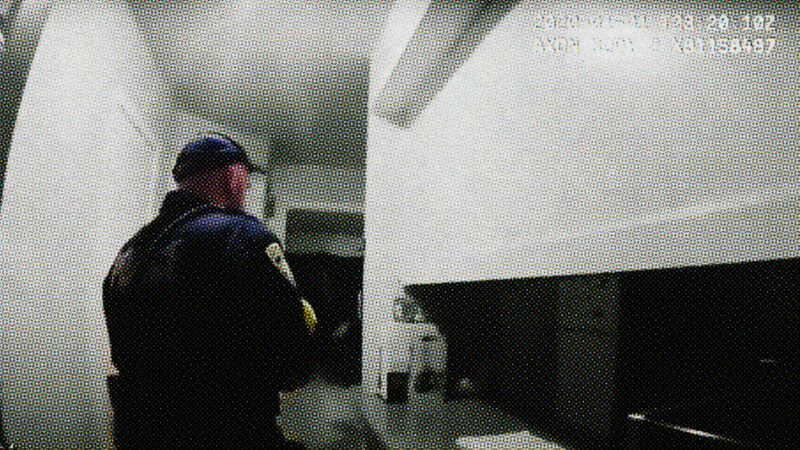This Cop Conducted 3 Warrantless Searches in Under 3 Years. He Gets To Keep His Job.
Once again, it shows just how hard it is to hold bad officers accountable.

A Baton Rouge Police Department (BRPD) officer will keep his job after conducting his third warrantless search in under three years.
Ken Camallo will be demoted from sergeant to corporal, The Advocate notes. He will also undergo a 75-day unpaid suspension.
But the officer will ultimately stay employed after racking up a slew of similar offenses and demonstrating a wanton disregard for the constitutional rights of those in his community.
BRPD declined to provide further comment.
Camallo's conduct attracted significant national attention after a Reason report last month first released body camera footage of a traffic stop on January 1, 2020, set in motion by Camallo because he spotted a car driving "suspicious[ly]." He'd seen it parked at a "known drug house," he said.
During that traffic stop, he and four other cops strip-searched a minor on a public street. In a recent press conference, BRPD said none of the officers will face discipline for that move.
But Camallo and Officer Troy Lawrence Jr. proceeded to conduct a warrantless search of the family's home, resulting in disciplinary reviews. Lawrence's is still ongoing.
Documents obtained by Reason show that this is not Camallo's first offense, however. An internal affairs history of his time on the force shows that he has a stain on his record for another warrantless entry in 2019.
Yet even that wasn't his first foray into unconstitutional searches. In 2017, a federal judge threw out all of the evidence in a case against a man indicted on illegal weapons charges after Camallo was found to have obtained the evidence earlier that year without a warrant. That case was eventually dropped.
Camallo's disciplinary history shows no demerit against him for that misconduct.
His most recent warrantless search resulted in criminal charges against Clarence Green, then 23, who sat in jail for five months after Camallo found a firearm on his person during the traffic stop. Green was prohibited from owning one while he was on probation for possession of oxycodone, according to the initial incident report.
But those police reports would come to change almost a dozen times after Camallo and Lawrence illegally searched Green's home—something that drew the scrutiny of a federal judge as he approved the state's request to drop the charges against Green. One of the altered police reports notes that Tanya Green, Clarence's mother, gave "written consent" to the search. She says that isn't true, and the body camera footage shows no such exchange.
"The state agents in this case demonstrated a serious and wanton disregard for Defendant's constitutional rights, first by initiating a traffic stop on the thinnest of pretext, and then by haphazardly invading Defendant's home (weapons drawn) to conduct an unjustified, warrantless search," wrote Judge Brian A. Jackson of the U.S. District Court for the Middle District of Louisiana. "Such an intrusion, in abject violation of the protections afforded by the Fourth Amendment of the United States Constitution, which protects citizens against unwarranted governmental intrusions in their homes, may justifiably be considered to be a trespass subject to prosecution under" Louisiana law.
Thomas Frampton, an attorney for the Green family, agrees. "The Supreme Court has said that officers may conduct a 'frisk'—meaning a brief pat-down of the outer garments—if the officer has a reasonable suspicion that the individual is armed," Frampton told Reason last month. "The reason that's okay, according to the Court, is because a properly conducted pat down is ostensibly non-invasive. A strip search on a public sidewalk, however, is something else altogether." The family recently settled for $35,000 against the city of Baton Rouge.
But real accountability will apparently be elusive for the Greens. That entire sum will come out of taxpayer dollars and was only reached after the family agreed to drop a civil suit. Camallo will not have to explain his actions in civil court—and he gets to keep his job.
Instead, the city is trying to hold Frampton accountable for sharing the body camera footage with the press. During May's BRPD press conference, the Parish Attorney's Office for East Baton Rouge notified him that it would seek to hold him in contempt of court and jail him for up to six months for disseminating the video, although the government had already made it publicly available in November of 2020.
Holding a rogue officer to account is no easy feat. At the center of the debate is qualified immunity, a legal doctrine that prohibits victims of government abuse from suing state actors if the precise way a public official violated your rights has not been explicitly ruled unconstitutional in a prior court precedent. That explains, for instance, why the cops who allegedly stole $225,000 while executing a search warrant, or the cop who shot a man who'd been sleeping in his car, or the cop who led a botched drug raid on the wrong house were all protected from civil liability. The victims were not permitted to bring their claims before a jury.
Firing a bad cop is perhaps even harder. The process is mired in safeguards enshrined by labor precedents and police unions, which have a history of defending their workers' most unsavory misdeeds. That is the purpose of any union, after all: to stick up for its people. That principle comes at a cost to the public they are supposed to protect, though, when considering that police unions represent the monopoly on state power.
The BRPD and the city of Baton Rouge did their best to produce the veneer of accountability. But in just two and a half months, Camallo will be back on patrol, protecting and serving.


Show Comments (18)